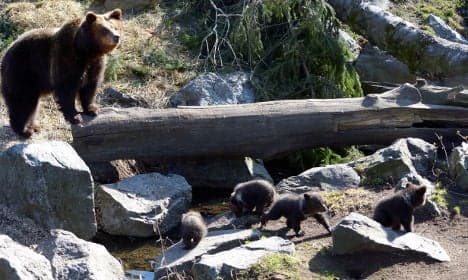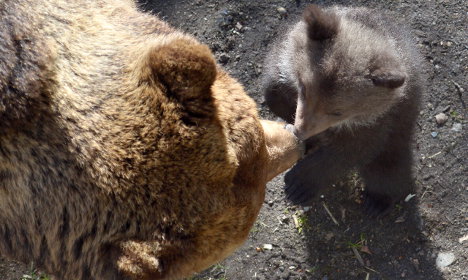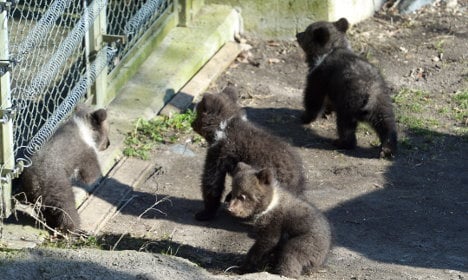The Swedish bear quadruplets that will make you go 'awww'

A quartet of adorable bear cubs have made their first public appearance at Skansen's zoo in Stockholm.
The quadruplets – Tassa, Tundra, Trubbel and Tiburtius – were born on January 11th and have so far stayed warm holed up inside Skansen's bear den tightly cuddled up to their mother, Lill-babs.
Lill-babs, who is named after this famous Swedish singer, first came out to have a look at the Swedish press corps gathered outside the enclosure before she allowed her cubs to follow.
"The mother peered out a couple of times, and it was a little tentative. She seemed to notice that a lot of people were looking. The bears are walking around now, and the cute babies are climbing on the rocks," said the TT news agency's reporter.

"Hi, Mummy." Photo: Janerik Henriksson/TT
Skansen zoo told visitors in a Facebook post: "They were born in January and only weighed around half a kilo each – not more than a bucket of butter. They have grown to six kilos now and that means it's time to explore the enclosure. Just like all other children they sleep a lot at first, so be patient if you don't see them immediately."
Every year, the bears at Skansen are let out of the den to roam their enclosure for the first time after their winter hibernation on April 14th – known as Tiburtius Day in Sweden – which is traditionally known as the first day of spring, at least according to old Swedish folklore.
Swedes used to say that if Tiburtius Day was warm and sunny, a cold and rainy summer would follow (it was 7C and mostly sunny outside The Local's headquarters in Stockholm on Thursday – we are not sure what this means).

They may look cuddly now, but... Photo: Janerik Henriksson
Around 2,700 wild brown bears live in Sweden, according to WWF. They are the country's largest predators with an adult male weighing up to 250 kilos, but are reserved and usually stay away from humans.
Comments
See Also
The quadruplets – Tassa, Tundra, Trubbel and Tiburtius – were born on January 11th and have so far stayed warm holed up inside Skansen's bear den tightly cuddled up to their mother, Lill-babs.
Lill-babs, who is named after this famous Swedish singer, first came out to have a look at the Swedish press corps gathered outside the enclosure before she allowed her cubs to follow.
"The mother peered out a couple of times, and it was a little tentative. She seemed to notice that a lot of people were looking. The bears are walking around now, and the cute babies are climbing on the rocks," said the TT news agency's reporter.

"Hi, Mummy." Photo: Janerik Henriksson/TT
Skansen zoo told visitors in a Facebook post: "They were born in January and only weighed around half a kilo each – not more than a bucket of butter. They have grown to six kilos now and that means it's time to explore the enclosure. Just like all other children they sleep a lot at first, so be patient if you don't see them immediately."
Every year, the bears at Skansen are let out of the den to roam their enclosure for the first time after their winter hibernation on April 14th – known as Tiburtius Day in Sweden – which is traditionally known as the first day of spring, at least according to old Swedish folklore.
Swedes used to say that if Tiburtius Day was warm and sunny, a cold and rainy summer would follow (it was 7C and mostly sunny outside The Local's headquarters in Stockholm on Thursday – we are not sure what this means).

They may look cuddly now, but... Photo: Janerik Henriksson
Around 2,700 wild brown bears live in Sweden, according to WWF. They are the country's largest predators with an adult male weighing up to 250 kilos, but are reserved and usually stay away from humans.
Join the conversation in our comments section below. Share your own views and experience and if you have a question or suggestion for our journalists then email us at [email protected].
Please keep comments civil, constructive and on topic – and make sure to read our terms of use before getting involved.
Please log in here to leave a comment.